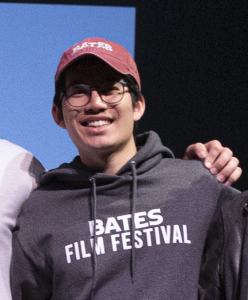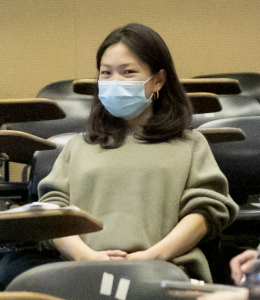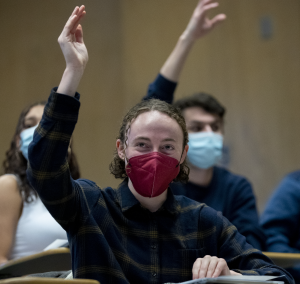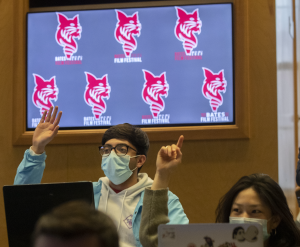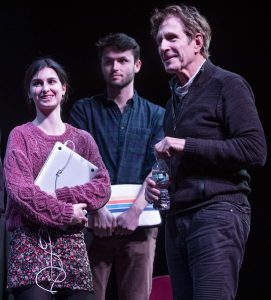By Daniella Pascucci (BFF 2019, Bates Class of 2020)
If you don’t know much about film festivals, this blog will help you understand not only how they’re a fundamental way for filmmakers to express their views on the world but also how festival are immersed in film production and distribution. Film festivals play a significant role as another channel of distribution for non-commercial films; they expose independent cinema to new audiences. Specifically, programming is a vital aspect of a film festival because it’s key for promoting and targeting an audience; it’s the main reason why films and film festivals are successful. Overall, film festivals provide shared and unique experiences where new ideas and perspectives meet in film.
At the 2019 Bates Film Festival, we decided to program a virtual reality event since it’s a rapidly growing and unpredictable technology. If you don’t know what virtual reality is, it’s a computer-simulated device that mimics physical presence in real or imagined worlds. I worked with two other classmates, Maddie Fagundo and Andrew Berg, to run this event. Although this topic is different from other films and discussions that we have had in class, we thought that bringing awareness to virtual reality would bolster intellectual discovery. Programming a completely new topic to represent would bring more students and community members who are interested in virtual reality, or technology for that matter, to the festival.
“Overall, film festivals provide shared and unique experiences where new ideas and perspectives meet in film”
We found a virtual reality film to screen called A Shared Space: Lewiston. Filmmakers Daniel Quintanilla, Shuab Mahat, and Hilowle Aden are virtual reality storytellers who share an immersive experience of two immigrants’ journey in Lewiston, Maine. This film specifically tells the story of two friends, co-directors Mahat and Aden, who grew up in Kenya in the world’s largest refugee camp. Today, they both raise their families in Lewiston. A Shared Space: Lewiston is an immersive experience that invites us to consider and question the spaces we occupy while offering a diverse perspective that will inspire thoughtful discussion of the social and political issues surrounding immigration.

In “Cinema Planet,” Jean-Michel Frodon highlights the “two major impulses driving the development of film festivals in recent times, the economic and aesthetic, and to examine how, despite their apparent disparity, they are inter-connected” (205). Film festivals were originally affiliated with commercial interests, particularly tourism. Then, festivals functioned as advertising for films that already exist; to help serve as a catalyst for distribution. Now, “there arises the fact that festivals are being turned into markets….it has become apparent that festivals may economically support the worldwide artistic dynamism of cinema” (205). Frodon is explaining that film festivals are responding to this development and taking advantage of it since more filmmakers from diverse backgrounds are making films. There’s an increasing demand to attract large groups of audiences and their “adaptability to an extensive range of types of scales” (206). Based on the development of film festivals, we thought that it would be important to program a new film topic that would attract a larger audience; incorporating this would cultivate important discussions. More importantly, we wanted to set a new precedent for the film festival.
“A Shared Space: Lewiston is an immersive experience that invites us to consider and question the spaces we occupy while offering a diverse perspective that will inspire thoughtful discussion of the social and political issues surrounding immigration.”
Going back to the topic of programming, Frodon claims “programming means that there is someone there, someone who has made choices, and these people wish to follow the propositions of the programmer” (207). The audience trusts the programming team to choose meaningful and insightful films that will appeal to a vast audience. Our job as programmers was to select the most engaging films and to have a good idea about what constitutes a “good” film. While choosing films to program for the festival, we mainly chose films that would align with our mission statement. As previously stated, we wanted to program A Shared Space: Lewiston because it would provide important discussions on social and political issues surrounding our community while also sharing an appreciation for the art of film. As programmers, we also wanted to choose films that would engage community members, not just Bates students. Programming is essential because it also highlights other aspects of festivals such as “films, directors, actors, topics, styles and countries as emerging or leading production areas” (208). Overall, programming is a central marketing source for film festivals.

As part of the virtual reality event, we also decided to program a panel discussion called borders and boundaries— featuring Daniel Quintanilla and Shuab Mahat, Spanish Professor Stephanie Pridgon, and Bates student Ke’ala Brosseau and moderated by Anthropology professor Jacqueline Lyon. This discussion was about how we can cross cultural barriers and spaces through film. Film can help break down barriers and cross barriers; this is a form of participating as a cultural agent. Quintanilla and Mahat were discussing how virtual reality allows us to go into spaces with which we are unfamiliar. The filmmakers said that specifically in Lewiston, there are marked boundaries and spaces that are occupied by certain people. Through their film A Shared Space, the audience could virtually experience other places and feel as if they’re part of someone else’s space as an immigrant in Lewiston. For example, Mahat lived in a refugee camp in Kenya and now has a family in Lewiston. In the film, he invited the audience to come into his home through virtual reality; this provided a sense of intimacy. Mahat transferred and shifted his experience across cultural borders from Kenya to Lewiston.
To wrap up, the importance of programming A Shared Space: Lewiston helped the audience understand and experience someone else’s space through film and what it means to belong culturally. This event ended up having great turnout at the festival—it even won an audience award. It was also successful because many Lewiston-Auburn community members attended, rather than just Bates students. Daniel Quintanilla was joined us for the virtual reality event. It was very exciting for him to be there since students and community members could ask him more questions in detail about virtual reality. I hope that future Bates Film Festivals will program another virtual reality event or be encouraged to program a completely different topic to engage a new audience. Organizing this festival has made me learn that programming is a key source of marketing since it contributes to attracting a wide range of audience members.
Works Cited
Frodon, Jean-Michel. “The Cinema Planet.” In The Film Festival Reader. Dina Iodanova, ed. 205-215. St. Andrews: St. Andrews Film Studies, 2013.


